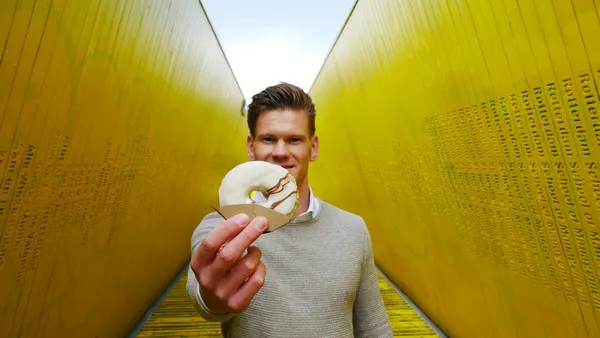Shoppers will soon find snack tomatoes in sustainable packaging in a Dutch supermarket. NIQ Supplies' Nick Polder developed it. Nick's also experimenting with soft fruit and grape packaging. It started with a hamburger in a handy, sustainable cardboard packaging. That's now grown into a company. It's engaged in thinking up, designing, and supplying sustainable packaging for sectors like the fruit and vegetable one.

Nick conceives, designs, and supplies unique, innovative, sustainable packaging for a broad market segment. "It all started with that hamburger while I was on vacation in New Zealand. It came in an easy-to-use, spill-proof cardboard disposable container. That concept can be put to good use in the Netherlands. I thought it could be used, for example, during festivals and food truck events. That's why, when I got home, I contacted the designer in question. I found that the patent was for sale in the European market," says Nick.
And that's how it all began. Nick started working with this hamburger-disposable box for the European market. He quickly got the hang of things. Other packaging solutions in various market segments attracted his attention. The starting point remained unchanged - a focus on sustainability, innovation, and creativity. "I'm now active in four different countries. Among other things, I design new disposable containers and packaging. I'm also involved in cooperation projects with companies. I'm expanding the sales of our standard sustainable packaging as well."
Multiple factors
Nick says there are many facets to whether something is genuinely sustainable. "After all, you have to consider transportation, production, shelf life, and presentation. Our role doesn't stop when a cardboard design doesn't turn out to be the solution. We also guide customers in making the right choices when it comes to plastics. There are many different types of plastics."
"There are alternatives with the same characteristics as plastics too. Both products have their advantages and disadvantages. That's why we produce all our clients' packaging in the Netherlands. Not in countries like Bulgaria, Turkey, and China. Most of the cardboard on the market still comes from there," Polder explains.
Social or marketing responsibility?
Nick doesn't think cellophane-wrapped cucumbers will quickly disappear off the shelves. Not when you consider all these factors. "It may not look very sustainable. But you have to realize that it extends the cucumber's shelf life. That also contributes to sustainability. I think many companies are too busy marketing responsible business instead of being socially responsible."
"That's mainly because they want to meet their clients' demands. But those aren't always correct. Just think about the fact of the development of the plastic bag in the '70s. It was meant to save trees. That's because plastic bags are much easier to reuse than paper ones," says Nick.
Special coating
Polder, however, doesn't see any chance of using sustainable, cardboard packaging for cucumbers. It can be used, but for other products. "Growers and sellers have specific needs per type of fruit or vegetable. Some fruit and vegetables have comparatively smaller margins. So, sustainable and, therefore, costlier cardboard packaging is less realistic. In these cases, NIQ Supplies' role changes slightly. I then take on an advisory role to help customers. If a product's packaging can be upgraded, NIQ Supplies will provide a first concept design within two weeks."
That, however, raises the question of whether cardboard packaging is feasible, given fruits' moisture content. Nick has recently found a solution for this - biocoating. "This coating goes on the inside of the cardboard. We can seal the cardboard's fibers. The fruit's acid content, therefore, affects the cardboard less. And, so, the entire packaging. Of course, we always first test our designs and the cardboard with the fruit in it. That means we don't have any nasty surprises during production. In this way, we can find a sustainable solution for every fruit or vegetable," Nick concludes.
For more information:Nick Polder
NIQ supplies
Tel: +31 (0) 646 053 037
Email: nick@niqsupplies.com
Website: www.Niqsupplies.com
